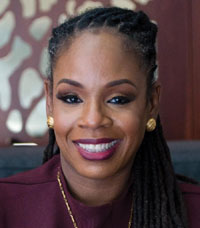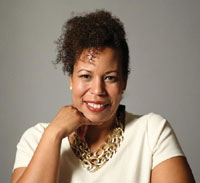
Checking the narrative on Black women’s leadership
It’s not only time to court Black Women’s Votes, but also support them as candidates
By Glynda C. Carr and Kimberly Peeler-Allen
In a recently published Rolling Stone article, recording artist Janelle Monae exposes a disconcerting, yet largely universal awareness shared by Black women seeking to exercise power: when we reveal ourselves to be human and inevitably imperfect, we are too often labeled unworthy and incapable of leading. It’s why, Monáe says, she spent the better part of a decade masking herself behind the persona of an android named Cindi Mayweather.

Monáe’s unusual response to coping with this awareness may be unique to entertainment, but her acknowledgment speaks broadly to the very harsh, extraneous judgments that women-particularly Black women-face when they attempt to lead. These judgments were on full display in a recent New York Magazine article that ostensibly explored the campaigns of the two women-Stacey Abrams, who is Black, and Stacey Evans, who is White-running to become Georgia’s Democratic gubernatorial candidate. What the article manages to offer, however, is litany of demeaning characterization of Abrams, including suggesting that she is “uppity,” financially ill-equipped, hard to relate to and unmarriageable. In short, the article is a regurgitation of some of the most demeaning and hostile labels that Black women come up against whenever they attempt to claim seats of power.
Progressives need to pay attention, because these imbalanced judgments are not only unfair, but also defeating in an age when Black women are an indispensible, and perhaps the most critical factor in Democrats prevailing come November. If we don’t check and challenge false narratives about the character and viability of Black women candidates seeking to serve at all levels of government in all types of communities, we will no doubt spend the next two years once again analyzing what went wrong.
Politics is inherently a word war between competitors, but the tenor of the criticisms hurled at Abrams reads especially personal and especially coded. Left unchecked, there is a real risk that these immaterial characterizations will over-shadow the strength of her qualifications. Abrams, who served eight years in the state legislature before stepping down to run for governor, is by far the most accomplished of the candidates vying for the top of Georgia’s Democratic ticket.
As house minority leader, the Ivy League-educated attorney blocked efforts to raise taxes on the poor and working families; protected access to reproductive healthcare; and passed legislation in support of grandparents and other kin raising children. She also started the New Georgia Project, which registered more than 200,000 voters over two years. Her vision for Georgia includes universal pre-K, living-wage jobs and criminal-justice reforms that level the field for all the state’s residents.
In short, Abrams has the kind of leadership experience, legislative track record, relatable story and vision for the state that voters across the board should be eager to support. But with the May 22 primary just weeks away, She has had to spend a good deal of time talking about her debt-a situation wrought largely by her need to support family members in need-instead of her vision for a new Georgia. The distraction is vexing for many reasons, including that debt is not a disqualifier for holding office. If it were, a majority of our elected officials-most especially our current president-would never have been elected.
The irrelevant scrutiny experienced by Abrams is hardly isolated. Black women candidates and elected officials face a litany of race- and gender-coded criticism about perceived shortcomings that are never mentioned in examining the qualifications of other candidates.
Too often, Black women seeking leadership are labeled with false narratives that paint them as angry instead of impassioned, financially irresponsible instead of willing to stretch their resources to help others, or young and inexperienced instead of ambitious and trailblazing. Recent examples of this are plentiful.
When St. Louis, Missouri, Treasurer Tishuara Jones lost her 2017 bid for mayor by just 888 votes against an establishment candidate with much deeper pockets, the city paper’s editorial board wrote that “a dose of humility” might have made voters more supportive of Jones’ candidacy. And when Lauren Underwood announced her candidacy for the Illinois 14th District U.S. House seat, many in the Democratic power structure were quick to write her off as non-viable even though she grew up in the district and previously served as a senior advisor to Department of Health and Human under President Barack Obama. Despite this criticism and a corresponding lack of Democratic establishment support, in March, Underwood took 57 percent of the Democratic Primary vote to beat out her six opponents-all men.
In November, Underwood, Abrams and hundreds of other Black women running for office across the country will face off against their opponents for local, state and national offices. Many of these women exemplify the kind of promising, proven leadership that progressives say they want. But if we refuse to challenge and correct damaging, false narratives about Black women’s leadership abilities-and records-we will ultimately deprive our towns, cities, states and country of the elected officials who are most connected, committed and able to address the inequities and divisions chipping away at our democracy.
There’s a lot on the line in 2018. If creating a fair, equitable and tolerant country is truly our goal, then we must make an urgent stand and put our resources behind candidates who embody these principals. That means not only courting Black women’s votes, but also supporting them as candidates who eager and ready to provide the kind of strong, effective leadership that can help turn our country around.
